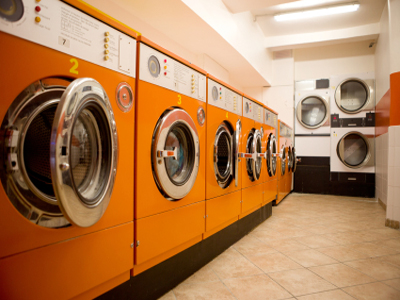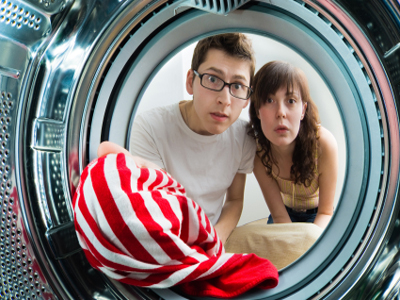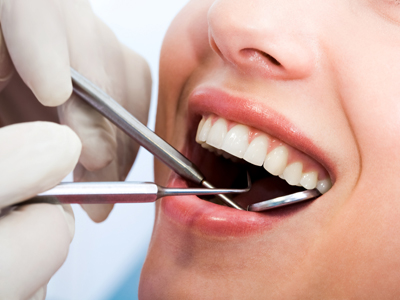
It's not surprising that a number of Californians looking into purchasing a small business decide they want to buy a coin laundry. The business can operate and produce money without needing constant owner involvement. In fact, a typical owner may work only an hour or two a day in the coin laundry business. And because it is an enterprise that deals only in cash, there is no need to carry receivables or to provide the service without getting paid. In fact, payment is made before the service is provided.
What is surprising is the number of potential buyers who are misinformed about a few important facts regarding the business and as a consequence are at risk of making an error when deciding to buy a specific business at a certain price, or when failing to recognize a good offering and neglecting to make an effort to buy it.
Even some business brokers who are not well informed about how to evaluate and buy a coin laundry are misinformed about critical aspects of the business and may give clients bad advice.
Four of the most common misconceptions held by many buyers and some business sales professionals are:
1. There's no worry about getting a lease for the property where the business is located. It's almost sure that the landlord doesn't want to change the use of the space where the coin laundry is located. It is too expensive and involved to remove all of the plumbing and convert a coin laundry property for some other use. Besides, if the business premises is part of a property with other retail businesses, the landowner wants to keep the coin laundry operating. That's because it will attract customers, while their clothes are in the machines, to the surrounding businesses. And that's an amenity that will cause other businesses to want to locate near the property. In other words, having a laundry in, for example, a strip mall, will help the landowner attract other commercial tenants. As the saying goes, once a coin laundry (at a location) always a coin laundry.
The Fact: I know of at least six cases in which buyers purchased a coin laundry with five years or less remaining on the lease, after they were convinced they would be able to renew once the lease expired. In one situation the landlord sold the property containing the laundry and other businesses to a developer who waited for the leases to expire, then knocked down the structures and built an apartment complex. Another landlord decided he wanted to be in the coin laundry business. At the end of the tenant's lease, the landowner refused to extend the lease and then offered to purchase the equipment from the former tenant, but at a fraction of the equipment value.
2. You can figure out the coin laundry's gross income by analyzing the water bills paid during the past several months. That's a way the buyer can verify the revenue figure and not have to rely on the seller's claims. The formula is fairly simple. It's starts with determining the amount of water purchased by the business over a period of time, say a month. Calculate the average amount of water used per wash by the washing machines, and divide that figure into the total water usage (the total usually is expressed in cubic feet on the water bill, but with simple math can be converted to gallons--about 7.5 gallons per cubic foot). The result of that division represents the number of washes sold in the month. Multiply that figure by the average cost per wash, to get the total amount collected from the washing machines during that period of time. A fairly useful rule of thumb is that the dryers generate one-third the sum produced by the washing machines. Some potential buyers, having done that exercise, discovered that the real sales volume was lower than the figure quoted by the seller.
The Fact: This seems like a clever way to figure out how much revenue the seller really has received, were it not for the fact that water meter measurements in many parts of the state - many parts of the U.S. for that matter - are extremely inaccurate. Another problem with this approach is that some sellers, knowing prospective buyers will do that math, simply run up their water usage - perhaps by leaving the spigot open in a wash tub or a bathroom sink - before they put the business on the market. Smart entrepreneurs who want to buy a coin laundry and feel it's helpful to analyze water usage, ask to see water bills going back a few years. And they become suspicious if the seller can't produce older records, or if the records indicate the water usage suddenly jumped a few months ago - about the time the owner decided to sell.
3. To determine the amount of adjusted net earnings collected by the owner of a coin laundry, simply count up add backs and include them in the total. The biggest add back may be depreciation, which is a non-cash expense.
The Fact: The fallacy in this approach is simply that much or all of the sum designated as depreciation may actually be needed to replace the equipment. And that is, technically, the purpose of depreciation. In some businesses, you can add back depreciation when determining seller's cash flow. That idea is not as accurate when dealing with a coin laundry.
4. The best coin laundries are the ones with the most machines. A business with 35 machines is bound to be producing fifty percent more revenue than one with 22 machines.
The Fact: An important trend in the coin laundry business is to replace many of the smaller machines with a few larger ones. The typical coin laundry that is popular with customers will have a few 20 lb. machines for the bachelor who wants to wash a few garments and towels with a single load or the customer wanting to wash a bed spread or other large item. It is the 40 and 55 lb. machines, however, that are the most popular among customers and will keep them coming back. People like the ability to handle a week's worth of clothing, towels, linen and so forth with one wash in a machine that will accommodate a bigger load. Customers figure they will save money that way, and they'll definitely save time. Look at the mix of machines rather than the number to determine how well the coin laundry business is attracting customers and generating revenue. It's better to have the 22 machines that are busy all of the time than a larger space and more machines to run and repair than will be used on a constant basis.
By understanding the truth behind some of the most common - not always accurate - assumptions regarding the laundromat business, a business buyer will be able to make wiser choices when deciding what to buy and how much to pay.
Contributor:


The Veld Group provides a refreshing approach to Business Brokerage, Mergers & Acquisitions and Business Consulting and Valuations. From Your Street to Wall Street, we cater to Main Street Businesses as well as more complex Strategic Firms and Start-Ups.
ServingSouthern California
Laundry consulting, due diligence, buyer representation: We preview laundries for you and evaluate them. 28 years laundry industry experience: buying, selling, valuing, retooling, analyzing, consulting services for laundry buyers and entrepreneurs in California. Contact us today about our services.
ServingSouthern California
I am an experienced entrepreneur, attorney, & business professor. I & my EvergreenGold® team offer business owners sound advice & expertise to build business value & achieve profitable sales. Call me today for a business evaluation & SWOT analysis for your business anywhere in the USA.
ServingNationwide
If your business involves alcoholic beverage sales, we can help. Obtaining a liquor license transfer or selling a business with a license in California does not have to be a frustrating and overwhelming process. We have procured thousands of licenses for our clients.
ServingAll Of California
Cheryl's a restaurant business broker, over 25 years in the bar and restaurant industry coupled with a J.D. Cheryl works tirelessly to create successful strategies and effective negotiations for those who wish to purchase a new or sell an existing bar, restaurant, cafe, or night club. 415-309-2722
ServingCity Of San Francisco
I am the Founder Of BizBen.com. I consult daily with intermediaries, business buyers, owner/sellers & advisors daily about buying and selling California small to mid-sized businesses. Contact me today about joining & utilizing BizBen, consultations, & advisory services.
ServingNationwide - All Areas
McGovern Escrow Services, Inc., is a leading independent escrow company. We are a trusted partner with our clients, assisting them through the tangled bulk sale & liquor license transfer process. We provide attentive, quality & innovative customer service. Phone Elizabeth McGovern at 415-735-3645.
ServingSan Francisco Bay Area, North Bay, Central Valley
For over 25 years Peter Siegel, MBA has been providing niche business purchase financial advisory and loan placement services with SBA Loans, Non SBA Financing, Retirement Plan Conversions, Note Restructures, etc. Call me regarding business purchase financing and to get pre-qualified: 925-785-3118.
ServingNationwide - All Areas

Laundromats and coin operated Laundromats are popular choices among business buyers as they often can be successfully run as an absentee run business. You need to be strategic about when you sell your Laundromat so you don't get taken to the cleaners by a buyer and so that you maximize your profits.

Buying a professional service business, like a dental practice, is one of the most profitable ventures you can enter into if you are considering becoming a small business owner. In this blog, Peter Siegel, MBA discusses six things you need to know about buying a successful dental practice or office.

Chuck Post a laundry consultant, specialty broker, buyer representative & due diligence advisor starts this discussion on why it's important to have an exit strategy in mind while buying a laundromat! He & others explain why this concept is so important for buyers especially in the laundry business.

Buying a liquor store can present some major challenges to business buyers - a recent client on the BizBen ProBuy Program relates to Peter Siegel, MBA what the major challenges may be when searching for and buying a Californa liquor store business. I welcome other Advisors to weigh in on this topic.

Sometimes business brokers just can't win with their clients, because if an offer comes in too fast & too early then they must have lowballed the price & the seller is suspicious, and if not enough offers come in after putting the business on the market - they may look unproductive to their clients.

